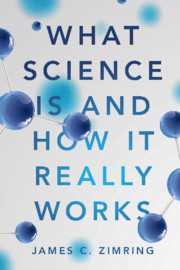Book contents
- What Science Is and How It Really Works
- What Science Is and How It Really Works
- Copyright page
- Dedication
- Contents
- Acknowledgments
- Introduction
- Part I
- Part II
- Part III
- 9 Remedies That Science Uses to Compensate for How Humans Tend to Make Errors
- 10 The Analysis of a Phantom Apparition, or Has Science Really Been Studied Yet?
- 11 The Societal Factor, or How Social Dynamics Affect Science
- 12 A Holistic World of Scientific Entities, or Considering the Forest and the Trees Together
- 13 Putting It All Together to Describe “What Science Is and How It Really Works”
- About the Author
- Index
10 - The Analysis of a Phantom Apparition, or Has Science Really Been Studied Yet?
from Part III
Published online by Cambridge University Press: 04 July 2019
- What Science Is and How It Really Works
- What Science Is and How It Really Works
- Copyright page
- Dedication
- Contents
- Acknowledgments
- Introduction
- Part I
- Part II
- Part III
- 9 Remedies That Science Uses to Compensate for How Humans Tend to Make Errors
- 10 The Analysis of a Phantom Apparition, or Has Science Really Been Studied Yet?
- 11 The Societal Factor, or How Social Dynamics Affect Science
- 12 A Holistic World of Scientific Entities, or Considering the Forest and the Trees Together
- 13 Putting It All Together to Describe “What Science Is and How It Really Works”
- About the Author
- Index
Summary
Young students of science may choose a career in research for a number of different reasons. Some are driven by an intrinsic curiosity about the world and a love of understanding how nature works. For others, the possibility of recognition and esteem are a driving force. Still others have a meticulous nature, and the notion of gaining and maintaining some control over experimental systems appeals to them. As is inevitably the case, some students pursue science because of the expectations of others rather than from their own interests and ambitions. Finally, some go into science because they’ve been in school their whole lives, haven’t given much thought to what the next step should be (other than moving on to the next grade, as they’ve always done in school), and really can’t figure out what else to do. Given the complexities of human behavior, for many, it is a combination of these factors and additional factors not mentioned here.
- Type
- Chapter
- Information
- What Science Is and How It Really Works , pp. 279 - 298Publisher: Cambridge University PressPrint publication year: 2019

